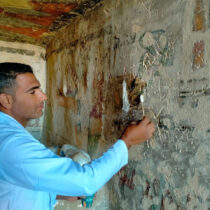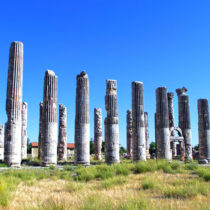The students of the PhD Program in Classical Antiquities and Their Fortune. Archaeology, Philology and History are pleased to announce the International Doctoral Conference “Frontiers of the Ancient Mediterranean”, which will be held at the University of Rome “Tor Vergata” (Italy) on January 23rd-24th, 2025.
Theme of the Conference
Barriers, boundaries and borders mark out spaces, to delimit the distance between different locations, cultures and languages. As Michel Foucault writes, the border is a spatial “device” regulating the relationship between what is inside and what is outside. Yet, the frontier, ductile and elastic, goes beyond tangible reality, touching the most intimate chords of the human soul: it not only separates, but invites confrontation, opens dialogue with others—starting from the narrowest of its meanings, the frontier of the flesh that distinguishes every human being from the outside world. In the interweaving of geographical, cultural, social and linguistic paths, the limes creeps in, giving spaces multiple nuances. The frontier, suspended between identity and individuality, defines a space, a culture, a language. Hence the need to regulate the relationship with otherness by means of a border, a concept expressed in Greek by ὅρος (the stone placed to mark a piece of land), which also indicates a legal limit. Similar is Latin finis (a furrow in the earth), which, however, has a sacral as well as a material texture. Beyond that finis chaos and disorder lie, but to go beyond it means to enter into a relationship with chaos, to possess and to dominate it. Complementary to finis is limes: if the former term represents a line, the latter configures an area in which the continuity between inside and outside, between order and chaos, prevails. The limes, then, represents a true frontier, a fortified barrier placed along the finis.
As a political concept, the frontier is a fundamental engine of relations between cities and states, between different worlds; building, denying, destroying walls, respecting or crossing borders—actions that determine or condition wars and peace treaties, balances and imbalances of power. Religion, too, in this perspective, often becomes a political and poetic tool as well as a sacred one; border shrines, as well as the archaeological contexts and the documentary material pertaining to them, help us reconstruct the threads of time that run through the Mediterranean. In literary experiences, moreover, the border exists in order to be crossed, starting with Odysseus, “frontier-man” as well as “memory-man”, an archetypal figure of the travellers who «stand on both sides of frontiers, large or small: at once inside and outside, intermediaries, ferrymen, transporters», as François Hartog writes.
As classicists from different backgrounds, we want to participate in the debate surrounding this topic, which has great potential of an interdisciplinary nature. With those who would like to accept our invitation, we wish to reflect on the multiple declensions of the concept of frontier, from the spatial dimension to the nature of a barrier that «the gaze excludes» (Giacomo Leopardi, The Infinite): what the Mediterranean is and has always been.
Organization of the Conference
Papers will be distributed in four panels:
You Who Are Different – Imaginary barriers rise along real borders: Greeks judge Romans, Romans judge Greeks, barbarians talk about Greeks and Romans and vice versa, amid cultural stereotypes and preconceptions.
Will you have other gods outside of me? – The religious practices, the mythical traditions and the shrines in liminal areas, in search of what divides and/or unites communities on the geographical, cultural or psychological margin.
Private Mediterranean – “Mediterranean-ness” through the mirror of gender identities, sexual practices, and power dynamics in interpersonal relationships.
Beyond the Garden – Artistic and literary expressions that challenge political and geographical boundaries.
Submission of Proposals
The Call for Papers is open to PhD students in classical disciplines, as well as to PhD graduates in the same disciplines who completed their degree no more than six years earlier. Proposals for original papers in Italian or English on these topics, or other aspects related to the history of ancient Mediterranean frontiers, are welcome.
To apply, please fill out the form at the link:
https://forms.gle/AoMb7PEtXF8cNhqE6 (Italian version)
https://forms.gle/hRvr8F85B7wFtjNi6 (English version).
The deadline for the submission of proposals is September 30th, 2024.
The organizing committee will report the outcome of the selection process by October 20th, 2024. Speakers will be asked to provide a written outline of their talk by January 10th, 2025.
Other Information
Speakers will pay a participation fee of € 50, which includes two lunches, all coffee breaks and the conference materials. Travel and accommodation expenses will be borne by participants.
The event will be held entirely and exclusively in-person at the University of Rome “Tor Vergata”, Macroarea di Lettere e Filosofia, 1st Columbia St., Rome, Italy.
Further information, including the full CFP and registration and program details, will be available at http://dott.antichita.uniroma2.it/. We will be happy to answer any questions by email at [email protected].





